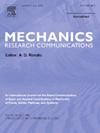Inclined flow of a second-gradient incompressible fluid with pressure-dependent viscosity
IF 2.3
4区 工程技术
Q3 MECHANICS
引用次数: 0
Abstract
Many viscous liquids behave effectively as incompressible under high pressures but display a pronounced dependence of viscosity on pressure. The classical incompressible Navier–Stokes model cannot account for both features, and a simple pressure-dependent modification introduces questions about the well-posedness of the resulting equations. This paper presents the first study of a second-gradient extension of the incompressible Navier–Stokes model, recently introduced by the authors, which includes higher-order spatial derivatives, pressure-sensitive viscosities, and complementary boundary conditions. Focusing on steady flow down an inclined plane, we adopt Barus’ exponential law and impose weak adherence at the lower boundary and a prescribed ambient pressure at the free surface. Through numerical simulations, we examine how the flow profile varies with the angle of inclination, ambient pressure, viscosity sensitivity to pressure, and internal length scale.
具有压力依赖黏度的二次梯度不可压缩流体的倾斜流动
许多粘性液体在高压下表现为不可压缩,但粘度对压力有明显的依赖性。经典的不可压缩的Navier-Stokes模型不能解释这两个特征,一个简单的压力相关修正引入了关于结果方程的适定性的问题。本文首次研究了不可压缩Navier-Stokes模型的二阶梯度扩展,该模型包括高阶空间导数、压敏粘度和互补边界条件。针对斜面上的稳定流动,我们采用Barus指数定律,在下界施加弱黏附,在自由表面施加规定的环境压力。通过数值模拟,我们研究了流动剖面如何随倾角、环境压力、粘度对压力的敏感性和内部长度尺度而变化。
本文章由计算机程序翻译,如有差异,请以英文原文为准。
求助全文
约1分钟内获得全文
求助全文
来源期刊
CiteScore
4.10
自引率
4.20%
发文量
114
审稿时长
9 months
期刊介绍:
Mechanics Research Communications publishes, as rapidly as possible, peer-reviewed manuscripts of high standards but restricted length. It aims to provide:
• a fast means of communication
• an exchange of ideas among workers in mechanics
• an effective method of bringing new results quickly to the public
• an informal vehicle for the discussion
• of ideas that may still be in the formative stages
The field of Mechanics will be understood to encompass the behavior of continua, fluids, solids, particles and their mixtures. Submissions must contain a strong, novel contribution to the field of mechanics, and ideally should be focused on current issues in the field involving theoretical, experimental and/or applied research, preferably within the broad expertise encompassed by the Board of Associate Editors. Deviations from these areas should be discussed in advance with the Editor-in-Chief.

 求助内容:
求助内容: 应助结果提醒方式:
应助结果提醒方式:


